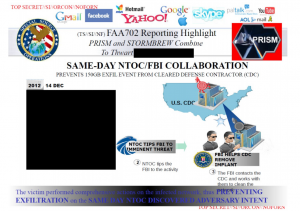Some time last summer, Ron Wyden wrote Attorney General Holder, asking him (for the second time) to declassify and revoke an OLC opinion pertaining to common commercial service agreements. He said at the time the opinion “ha[d] direct relevance to ongoing congressional debates regarding cybersecurity legislation.”
That request would presumably have been made after President Obama’s April 25, 2012 veto threat of CISPA, but at a time when several proposed Cybersecurity bills, with different information sharing structures, were floating around Congress.
Wyden asked for the declassification and withdrawal of the memo again this January as part of his laundry list of requests in advance of John Brennan’s confirmation. Then, after having been silent about this request for 8 months (at least in public), Wyden asked again on September 26.
It appears that Wyden had intended to ask the question of one of the witnesses at an open Senate Intelligence Committee hearing (perhaps Deputy Attorney General James Cole), but — having had warning of his questions (because he sent them to the witnesses in advance) — Dianne Feinstein and Susan Collins ensured there would not be a second round of questions.
As it happens, Wyden made the request for the memo two days after DiFi told The Hill she was preparing to advance her version of CISPA, and the day after Keith Alexander started calling for cybersecurity legislation again.
In a brief interview with The Hill in the U.S. Capitol on Tuesday, Feinstein said she has prepared a draft bill and plans to move it forward.
The legislation would be the Senate’s counterpart to the Cyber Intelligence Sharing and Protection Act, known as CISPA, which cleared the House in April.
CISPA would remove legal barriers that prevent companies from sharing information with each other and the government about cyber attacks. It would also allow the government to share more information with the private sector.
Since then, Alexander has pitched new cybersecurity legislation in an “interview” with the NYT, admitting he needs to be more open about his places for cybersecurity.
Now, the Executive Branch’s unwillingness to actually share the law as it interprets it with us mere citizens prevents us from understanding precisely what relationship this OLC memo has with proposed cybersecurity legislation — but Wyden made it clear in January that it does have one. But here are some things we might surmise about the memo:
- The Administration is currently relying on this memo. If it weren’t using it, after all, it wouldn’t need to be revoked. That means that since at least January 14, 2011 (before which date Wyden and Russ Feingold first asked it be revoked), the Administration has had a secret interpretation of law relating in some way to cybersecurity.
- The interpretation would surprise us. As Wyden notes, “this opinion is inconsistent with the public’s understanding of the law” (he doesn’t say what that law is, but I’ll hazard a guess and say it pertains to information sharing). It’s likely, then, that some form of online provider has been sharing cyber-intelligence with the federal government under some strained interpretation of our privacy protections (and, probably, some kind of Attorney General assurances everything’s cool).
Let’s use the lesson we learned during the FISA Amendments Act where the telecoms were clambering for the legislation and the retroactive immunity, but the Internet companies were grateful for “clarity,” but explicitly opposed to retroactive immunity. When we learned the telecoms had been turning over the Internet companies metadata and content, this all made more sense. The Internet Companies wanted the telecoms to be punished for stealing their data.
In this case, in the first round of CISPA (which had broad immunity protections), Facebook and Microsoft were supporters. But in this go-around (which has still generous but somewhat more limited immunity), the big supporters consist of:
- Telecoms (AT&T, Verizon; interestingly, Sprint did not sign a letter of support)
- Broadband and other backbone providers (Boeing, Cisco, Comcast, TimeWarner, USTelecom)
- Banks and financial transfer
- Power grid operators and other utilities
Now, who knows with which of these entities the government is already relying on this common commercial services memo, which of our providers we believe have made some assurances to us but in fact they’ve made entirely different ones.
But I will say the presence of the telecoms, again, angling for immunity for information sharing, along with their analogues the broadband providers does raise questions. Especially considering Verizon Exec’s trash talking about consumer-centric Internet companies that don’t prioritize national security.
Stratton said that he appreciated that “consumer-centric IT firms” such as Yahoo, Google, Microsoft needed to “grandstand a bit, and wave their arms and protest loudly so as not to offend the sensibility of their customers.”
“This is a more important issue than that which is generated in a press release. This is a matter of national security.”
After all, the telecoms have a history of willingly cooperating with the government, even if it bypassed the protections offered by Internet companies, even if it violated the law. Have they been joined by big broadband?
Well, DOJ could clear all this up by revoking and releasing the memo. Until they do, though, my wildarsed guess is that those operating the Toobz in the country — the telecom and broadband companies — have already started sharing consumers’ data that a plain reading of the law seemingly wouldn’t permit them to do.

![[photo: Gwen's River City Images via Flickr]](http://www.emptywheel.net/wp-content/uploads/2013/11/StalkerWindow_GwensRiverCityImages-Flickr.jpg)

